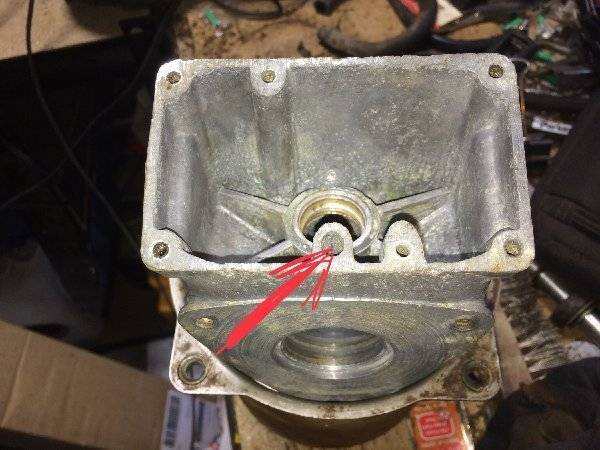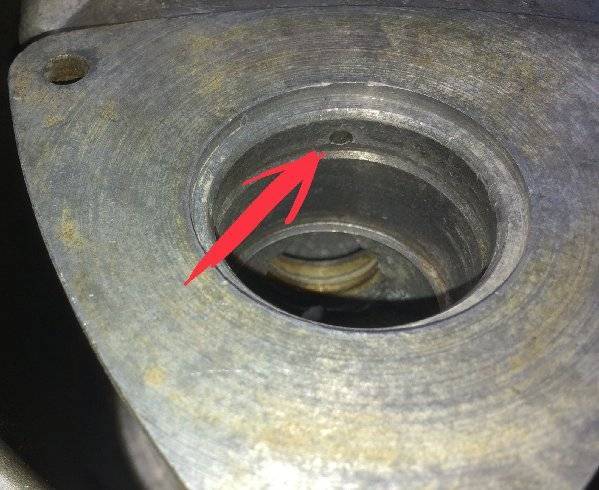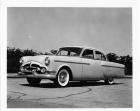|
Re: A Tale of Two Patricians
|
||||
|---|---|---|---|---|
|
Home away from home
|
Quote:
No idea what the bleeder valve he talks about might be. Obviously Packard never used it if it was Cadillac only but the port is just a hole present on both versions Packard used so keep us advised on how and where you place it if you modify the casting. The new casting has the place for the vent cast into it but it's simply not drilled. I'll try to get more specifics tomorrow but basically the hole is drilled through the cast bit on center with the bore and parallel with the cylinder's mounting surface which is also perpendicular to the bore. The hole is about 1/8" diameter and is located just outside the snap ring groove. From the reservoir side where the top plate goes, the hole is relieved (made larger) nearly through but just shy of breaking out into the bore. It appears to stop about 1/8" back from breaking through.
Posted on: 2019/6/12 22:30
|
|||
|
All generalities are false.
Once I thought I was wrong but I was mistaken. Don Pierson Packard / IMPERIAL page CA DMV Licensed Vehicle VIN Verification 1951 Henney-Packard 3-Door Long Wheelbase Air Force Ambulance The 1951 Henney-Packard is For Sale! 1954 Packard Patrician 1954 Packard Patrician Parts Car 1956 Clipper Custom Sedan |
||||
|
||||
|
Re: A Tale of Two Patricians
|
||||
|---|---|---|---|---|
|
Home away from home
|
Quote:
No idea what kind of engine your dad's tractor has but anecdotally several posts on the forum from those who have got their Packard going and burned stale gas in the tank that seemed to be fine. The next day they went out and tried to start the engine and found the valves had stuck. Whether the gas is the culprit or not is unknown but it does seem suspicious. If it is really old gas just something to think about. I had that happen to me on my 1952 Henney-Packard but the gasoline did not smell like gasoline either when it finally occurred to me to check it and it barely burned. It smelled like a cross between gasoline and turpentine so only partially bad (or partially good if you prefer) but I've had gasoline that smelled completely like turpentine too. The stuff that came out of my 1965 Cadillac's tank was far beyond that and I still get whiffs of it now and then were some got onto the ground. That tank had to be cut open, sandblasted and resealed to be usable as no one makes a reproduction.
Posted on: 2019/6/12 22:37
|
|||
|
All generalities are false.
Once I thought I was wrong but I was mistaken. Don Pierson Packard / IMPERIAL page CA DMV Licensed Vehicle VIN Verification 1951 Henney-Packard 3-Door Long Wheelbase Air Force Ambulance The 1951 Henney-Packard is For Sale! 1954 Packard Patrician 1954 Packard Patrician Parts Car 1956 Clipper Custom Sedan |
||||
|
||||
|
Re: A Tale of Two Patricians
|
||||
|---|---|---|---|---|
|
Home away from home
|
The Treadlevac vent hole that we've been discussing is apparently there to return any fluid that might make it passed the piston but I'm not sure how it does that when it would mean that the fluid would have to go uphill about an inch in order to return to the reservoir. I'm sure that the system would work just as well without it,
In any event, for those who don't know what we're talking about, here are some photos. The first shows where it comes out at the reservoir and the second shows where it goes into the shaft bore. At the top it is about .200" dia and it breaks through, as I mentioned above, just ahead of the snap ring groove. In fact, it appears to break into the groove very slightly. The larger hole seems to go down to the same level as the counterbore on the mounting surface that is visible in the photos but it appears to have been done using a tapered reamer rather than being relieved using a larger drill as I had said. I can't see that one is better than the other but I'll probably do it using the reamer as it's actually easier. I forgot to get the measurements needed to calculate the taper required but will try to do so while I'm here. As for the gasoline, I took out close to 11 gallons so the tank wasn't full but that's still more, and in better condition, than I expected. It looked clean too but not good for any engine as a sample that I set afire under controlled, safe conditions burned readily but didn't go whoosh as it should have. Instead it burned with a heavy, black acrid smoke that would definitely build up in places where it shouldn't inside an engine and cause all sorts of grief.
Posted on: 2019/6/13 19:25
|
|||
|
All generalities are false.
Once I thought I was wrong but I was mistaken. Don Pierson Packard / IMPERIAL page CA DMV Licensed Vehicle VIN Verification 1951 Henney-Packard 3-Door Long Wheelbase Air Force Ambulance The 1951 Henney-Packard is For Sale! 1954 Packard Patrician 1954 Packard Patrician Parts Car 1956 Clipper Custom Sedan |
||||
|
||||
|
Re: A Tale of Two Patricians
|
||||
|---|---|---|---|---|
|
Forum Ambassador
|
Relief port gives fluid and air a destination. The hydraulic seal lets a tiny amount of fluid pass, even though it might go uphill and fill the channel it still can move to a safe place. Without the port, with the tiny amount of normal leakage which the Bendix description says is there on purpose to lube the seal, when the fluid is subjected to several hundred pounds of pressure thanks to the ram if there is no place to go it eventually fills the seal area and is forced thru a relatively thin vacuum seal and into the power section. A leaking seal would be even worse and the relief port at least gets fluid to the reservoir because that route is much easier than forcing thru another seal. Conversely, if the vacuum side seal fails it can suck a minimal amount of fluid that might be in the channel and normal leakage but since the opening is high in the reservoir it will eventually suck air before pulling much more fluid. Without the port vacuum would also want to pull more than the normal amount of leakage fluid around the hydraulic seal and could pull a lot more into the vacuum side.
Posted on: 2019/6/13 19:53
|
|||
|
Howard
|
||||
|
||||
|
Re: A Tale of Two Patricians
|
||||
|---|---|---|---|---|
|
Home away from home
|
PackardDon
HH56 beat me to it. I to don't think it is a fluid return to the reservoir. My expectation is the small hole in question is an atmospheric vent between the two seals. It should vent the seal cavity to the reservoir gasket surface, thus segregating the pneumatic seal from the hydraulic seal. I think the intent, as mentioned by HH56, is to keep us from one seal failure from sucking all of the brake fluid out of the reservoir. The cavity itself could be dry or wet ( 'wet' because we over filled the reservoir or a small hydraulic leak), it would still be an atmospheric vent either way. dp
Posted on: 2019/6/13 20:45
|
|||
|
||||
|
Re: A Tale of Two Patricians
|
||||
|---|---|---|---|---|
|
Home away from home
|
That was, of course, my over-simplification but thank you both for elaborating. Howard's comments were virtually identical to what I had said to the vendor selling the new castings but haven't heard back yet. These castings appear well-made but do not have any of the markings on them for obvious reasons (hint: trademarks).
Posted on: 2019/6/13 21:03
|
|||
|
All generalities are false.
Once I thought I was wrong but I was mistaken. Don Pierson Packard / IMPERIAL page CA DMV Licensed Vehicle VIN Verification 1951 Henney-Packard 3-Door Long Wheelbase Air Force Ambulance The 1951 Henney-Packard is For Sale! 1954 Packard Patrician 1954 Packard Patrician Parts Car 1956 Clipper Custom Sedan |
||||
|
||||
|
Re: A Tale of Two Patricians
|
||||
|---|---|---|---|---|
|
Home away from home
|
I'm heading to my Oregon shop this week for the longest visit yet so I hope the weather stays cool enough to work. It can get very hot there and especially in my uninsulated steel building. I have a lot to do but not sure how much of it will be on the Patricians other than possibly finishing the Treadlevac and installing it and trying to organize all the bits and pieces I've removed from the parts car that are currently in the way.
Question. I discovered recently that the Polaris Blue on my parts car did not have many made for 1954 (one owner said he was told that there were only 10) and the only reason I had intended on keeping my car grey is that I have a usable grey interior, spare grey doors and a nice grey dash. However, I do like the two-tone blue better so am considering switching even though I also have two gallons of the proper grey lacquer but looking at the paint cross-reference chart, I see Polaris Blue listed only for 1953. Would something like this be the same for 1954?
Posted on: 2019/8/24 13:42
|
|||
|
All generalities are false.
Once I thought I was wrong but I was mistaken. Don Pierson Packard / IMPERIAL page CA DMV Licensed Vehicle VIN Verification 1951 Henney-Packard 3-Door Long Wheelbase Air Force Ambulance The 1951 Henney-Packard is For Sale! 1954 Packard Patrician 1954 Packard Patrician Parts Car 1956 Clipper Custom Sedan |
||||
|
||||
|
Re: A Tale of Two Patricians
|
||||
|---|---|---|---|---|
|
Home away from home

|
Don,
Cool? What is that? I work awhile in the un-air-conditioned garage, then come back into the a/c for a while! Currently a humid 93.
Posted on: 2019/8/24 14:51
|
|||
|
||||
|
Re: A Tale of Two Patricians
|
||||
|---|---|---|---|---|
|
Home away from home
|
It also gets bitterly cold there where no heater can make it accessible. I can't wait to get insulation and some kind of protection from the single-digit cold. Fortunately humidity isn't an issue as it's also often single-digit. I just bought a part on eBay and after paying, I noticed that it was coming from "the dry high desert of Central Oregon" which turned out to be the same rural town of Terrebonne where my shop is!
Posted on: 2019/8/24 14:56
|
|||
|
All generalities are false.
Once I thought I was wrong but I was mistaken. Don Pierson Packard / IMPERIAL page CA DMV Licensed Vehicle VIN Verification 1951 Henney-Packard 3-Door Long Wheelbase Air Force Ambulance The 1951 Henney-Packard is For Sale! 1954 Packard Patrician 1954 Packard Patrician Parts Car 1956 Clipper Custom Sedan |
||||
|
||||

 (236.87 KB)
(236.87 KB)








